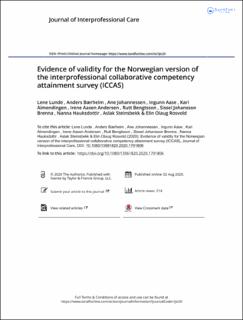Evidence of validity for the Norwegian version of the interprofessional collaborative competency attainment survey (ICCAS)
Lunde, Lene; Baerheim, Anders; Johannessen, Ane; Aase, Ingunn; Almendingen, Kari; Andersen, Irene Aasen; Bengtsson, Rutt Venke; Brenna, Sissel Johansson; Hauksdottir, Nanna; Steinsbekk, Aslak; Rosvold, Elin Olaug
Peer reviewed, Journal article
Published version

Åpne
Permanent lenke
https://hdl.handle.net/11250/2678736Utgivelsesdato
2020Metadata
Vis full innførselSamlinger
- Import fra CRIStin [3580]
- Institutt for helse- og omsorgsvitskap [2721]
Originalversjon
Lunde, L., Bærheim, A., Johannessen, A., Aase, I., Almendingen, K., Andersen, I. A., … Rosvold, E. O. (2020). Evidence of validity for the Norwegian version of the interprofessional collaborative competency attainment survey (ICCAS). Journal of Interprofessional Care, 1–8. 10.1080/13561820.2020.1791806Sammendrag
This was a validation study of the Norwegian version of The Interprofessional Collaborative Competency Attainment Survey (ICCAS). ICCAS consists of 20 retrospective pre- and post-questions, where respondents rate their agreement with regard to self-assessed competencies after participating in interprofessional education courses. It has been validated across various settings. The questionnaire was translated using the back-translation technique. We investigated evidence of validity regarding content, response process, and internal structure. Data were obtained from health and social care students (n = 1440, response rate 42.8%) participating in 12 different interprofessional courses in seven education institutions in Norway using a cross-sectional design. Exploratory factor analysis indicated one retracted factor for pre-scores and one retracted factor for post-scores. High McDonald’s omega values indicated good internal consistency. Item deletion did not improve the scale’s overall consistency on pre- or post-scores. We observed higher mean post-scores than pre-scores with moderate-to-large effect sizes, indicating a positive change in self-assessed interprofessional capabilities after training. Our findings indicate that the Norwegian version of ICCAS is a valid tool that may be implemented across a wide range of interprofessional education courses. Finally, our findings support earlier recommendations that ICCAS should be analyzed at an overall level to address change in interprofessional capabilities.
